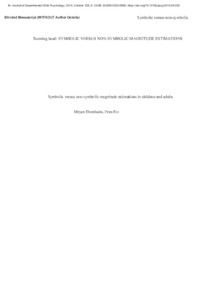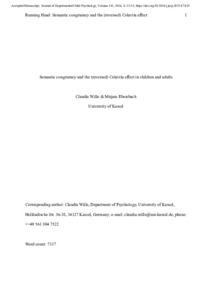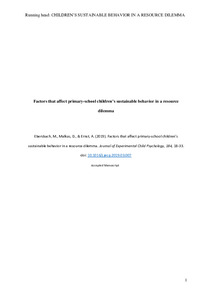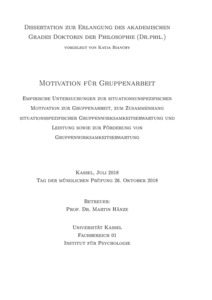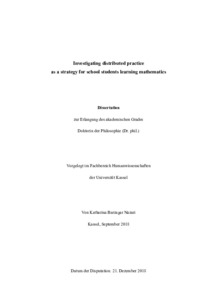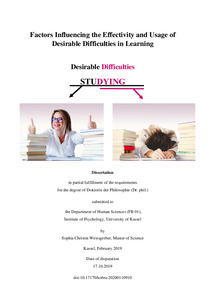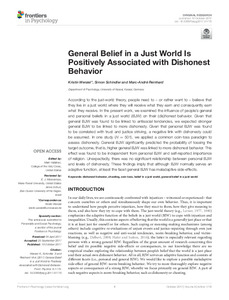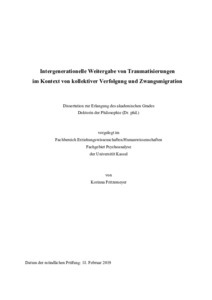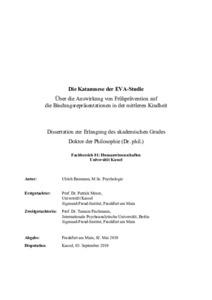Suche
Anzeige der Dokumente 1-10 von 70
Aufsatz

 Symbolic versus non-symbolic magnitude estimations among children and adults
Symbolic versus non-symbolic magnitude estimations among children and adults
(2014-07-30)
The ability of children and adults to generate symbolic and non-symbolic magnitude estimations was examined in the light of their familiarity with numbers. Children (6-year-old kindergartners, 7-year-old first graders, and 9-year-old third graders) and adults made symbolic estimations either by saying number words that matched numbers of dots (i.e., perception task) or by generating numbers of dots that matched given number words (i.e., production task). In the non-symbolic estimation task, participants generated the ...
Aufsatz

 Semantic congruency and the (reversed) Colavita effect in children and adults
Semantic congruency and the (reversed) Colavita effect in children and adults
(2016)
When presented with auditory, visual, or bimodal audiovisual stimuli in a discrimination task, adults tend to ignore the auditory component in bimodal stimuli and respond to the visual component only (i.e., Colavita visual dominance effect). The same is true for older children, whereas young children are dominated by the auditory component of bimodal audiovisual stimuli. This suggests a change of sensory dominance during childhood. The aim of the current study was to investigate, in three experimental conditions, ...
Aufsatz

 Factors that affect primary school children’s sustainable behavior in a resource dilemma
Factors that affect primary school children’s sustainable behavior in a resource dilemma
(2019)
Acting ecologically sustainably and not exhausting natural resources is becoming more and more important. Sustainable behavior can be investigated within the conceptual frame of resource dilemmas, in which users share a common, slowly regenerating resource. A conflict emerges between maximizing one’s own profit and maintaining the resource for all users. Although many studies have investigated adults’ behavior in resource dilemmas, barely anything is known about how children deal with such situations and which factors ...
Dissertation

 Motivation für Gruppenarbeit
Motivation für Gruppenarbeit
(2018)
Gruppenarbeit als Lehr-/Lernform bei der Lernende gemeinsam und relativ selbstgesteuert an einer Aufgabe arbeiten, gibt Anlass zu zahlreichen Forschungsfragen wie beispielsweise der Frage nach der Strukturierung der Gruppenarbeit oder ihren Effekten oder den individuellen Lernervoraussetzungen. Gruppenarbeit kann so strukturiert werden, dass die Lernenden in positiver Weise voneinander in der Zielerreichung abhängen, bzw. die Aufgabe nur gemeinsam erfolgreich bearbeiten können. Neben der Strukturierung des Arbeitssprozesses ...
Dissertation

 Investigating distributed practice as a strategy for school students learning mathematics
Investigating distributed practice as a strategy for school students learning mathematics
(2018-09)
Spacing or distributed practice is a prominent learning strategy that is related to the so-called desirable difficulties. With distributed practice, a given learning duration is interrupted by at least one break of variable length. In contrast, with massed practice the same total time is spent learning, but without interruption. There is a rich body of empirical evidence proving the positive effect of distributed practice on the retention of verbal material. Beyond rote memory, however, the empirical grounds regarding ...
Dissertation

 Factors Influencing the Effectivity and Usage of Desirable Difficulties in Learning
Factors Influencing the Effectivity and Usage of Desirable Difficulties in Learning
(2019-02)
What circumstantial factors or personality factors influence the effectivity of desirable difficulties, and correspondingly, the attitudes to and the usage of desirable difficulties? The dissertation covers externally regulated (laboratory and classroom) and self-regulated learning and starts with a brief introduction of the concept of desirable difficulties and a literature review of selected papers on disfluency, interleaving and spacing, as well as testing and generation. The literature review focuses on effectivity ...
Aufsatz
 General Belief in a Just World Is Positively Associated with Dishonest Behavior
General Belief in a Just World Is Positively Associated with Dishonest Behavior
(2017-10-10)
According to the just-world theory, people need to – or rather want to – believe that they live in a just world where they will receive what they earn and consequently earn what they receive. In the present work, we examined the influence of people’s general and personal beliefs in a just world (BJW) on their (dis)honest behavior. Given that general BJW was found to be linked to antisocial tendencies, we expected stronger general BJW to be linked to more dishonesty. Given that personal BJW was found to be correlated ...
Dissertation

 Intergenerationelle Weitergabe von Traumatisierungen im Kontext von kollektiver Verfolgung und Zwangsmigration
Intergenerationelle Weitergabe von Traumatisierungen im Kontext von kollektiver Verfolgung und Zwangsmigration
(2019)
Die kumulative Dissertation beschäftigt sich mit Traumatisierungen durch kollektive Verfolgung und Gewalt. Sie geht der Frage nach, wie diese Traumatisierungen sich auf elterliche Fähigkeiten und auf die Kinder der Traumatisierten auswirken. Ein besonderer Fokus liegt auf den zusätzlichen Herausforderungen von durch Krieg und Verfolgung erzwungener Migration.
Auf eine inhaltliche Einführung zum Thema intergenerationelle Weitergabe von Traumatisierungen werden die beiden Forschungskontexte sowie meine Tätigkeiten ...
Aufsatz

 Reading a short story changes children’s sustainable behavior in a resource dilemma
Reading a short story changes children’s sustainable behavior in a resource dilemma
(2019-12-02)
Fostering sustainable behavior in children and adolescents should be a central aim of today’s education. Even though the interplay of factors affecting sustainable behavior is complex, simple interventions can be effective too. In the current study, 10-year-olds (N = 132) were read a short story about two foresters who collectively used a forest to gain timber, facing a resource dilemma that involved striving for maximizing their individual profit while sustaining the forest. In the story, the foresters solved the ...
Dissertation

 Die Katamnese der EVA-Studie
Die Katamnese der EVA-Studie
(2019-05-02)
Die frühestmögliche Prävention bei den sogenannten Hochrisikokindern in den deutschen Großstädten ist zu einer gesamtgesellschaftlichen Aufgabe geworden. Zahlreiche Erkenntnisse aus den Erziehungswissenschaften, der empirischen Entwicklungspsychologie und der psychoanalytischen Forschung konvergieren in der Einsicht, dass tragende emotionale Beziehungserfahrungen in den ersten Lebensjahren die besten Voraussetzungen für eine gelingende psychosoziale und kognitive Entwicklung einschließlich des Spracherwerbs und des ...

